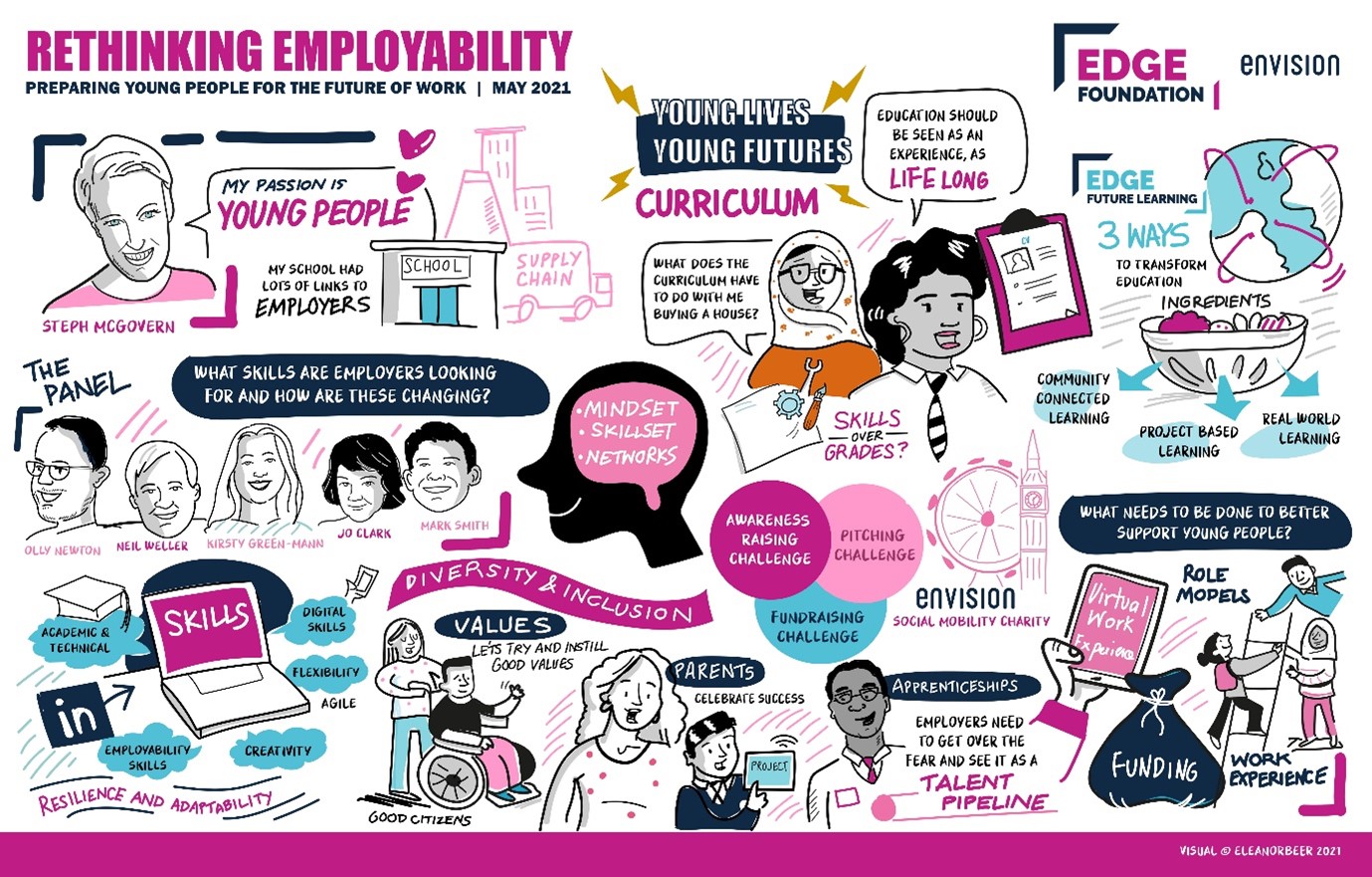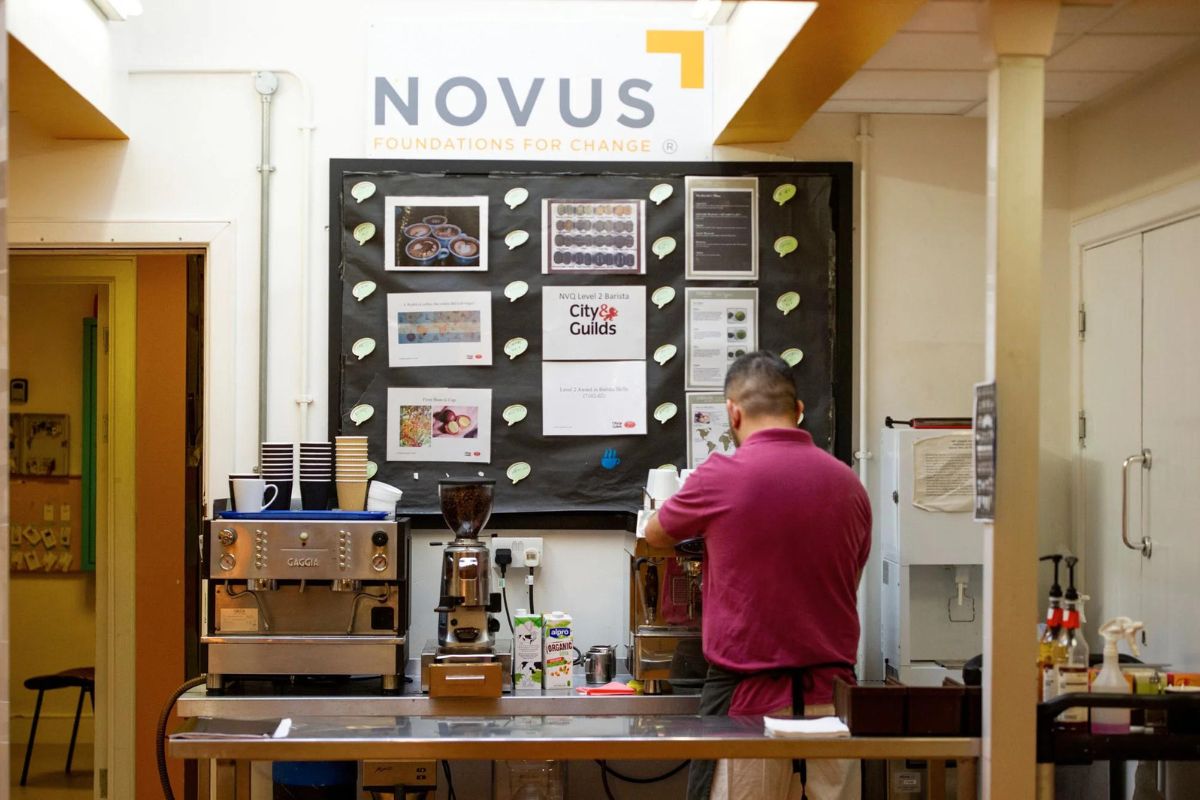“Re-thinking Employability” – Preparing young people for the future of work

Our young people are our future designers, thinkers and leaders, but far from being the ‘lost generation’, we can support them to be the ‘bounceback generation’, poised at the forefront of exciting and perhaps unpredictable change.
As the world prepares for the onset of the fourth industrial revolution, young people are likely to enter a future labour market influenced by trends and radical transformations out of our control.
We are faced with significant skills shortages in the UK
Now more than ever before, the implications of Brexit, Covid-19 and the fourth industrial revolution are exacerbating the scale of skills shortages across the UK. Here at Edge, we produce a regular series of Skills Shortages bulletins working with organisations and academics across the sector, to summarise the key messages we’ve been hearing:
Key message 1: The skills employers are seeking are technical and transferable
So that they can prepare and adapt, we need to equip our young people with the skills they need to flourish in their broader lives and changing world of work. Employers tell us that the skills they seek are overwhelmingly technical and transferable. Indeed, LinkedIn’s Global Talent Trends (2019) found that 92% of employers said that so-called ‘soft skills’ are equally or more important than hard skills, such as:
- creativity
- persuasion
- collaboration
- adaptability, and
- time management
But isn’t it time we moved away from framing these as simply ‘soft skills’?
Rather, these skills should be seen as ‘core’ and ‘essential’ to everyday life, underpinning the way that we think, create and interact with others. Edge’s partners at Skills Builder Partnership have an excellent framework summarising these essential skills and how young people can develop them:

Key message 2: Skills employers are seeking are not being prioritised within the education system
Despite the clear evidence from employers, the skills and attributes above are, in many cases, being deprioritised by current education policy. Indeed, the OECD has said that traditional ways of educating are losing currency and relevance and are not adapting quickly enough to the needs of a dynamic economy.
We need to reinvigorate our education system and for us, this means embedding three key principles to bring education to life – Community Connected Learning, Project Based Learning and Real World Learning.
You can watch this video from Edge Future Learning to see how this vision can be brought to life:
Key message 3: Skills shortages are numerous and costly
The UK skills mismatch is reinforced by the Industrial Strategy Council’s report which highlighted that by 2030, 7 million additional workers could be under-skilled for their job requirements – this would currently constitute about 20% of the labour market.
Meanwhile, employer and public investment in training for existing workers is low and Government spending on adult learning in England declined 47% in the decade from 2009-10 to 2018-19. As a result, businesses are having to spend more to secure and develop talent, spending out on recruitment fees, increased salaries and training to a total tune of £6.1 billion per year.
Key message 4: There has been significant change in the labour market and this is set to continue
While the scale of the economic impact of the Coronavirus pandemic is yet to be fully understood, the Learning and Work Institute highlighted that its impact on the labour market has been profound with the impacts unevenly spread.
Young people face a double whammy of disrupted education and a tough labour market; unemployment is rising fastest in ‘left behind’ areas and workers in lower-level occupations and with fewer qualifications more vulnerable to unemployment.
Given the messages above, it is clear that urgent change is needed.
However, rather than allowing the messages on skills shortages to paint a demoralising picture, we must aggregate and amplify these messages to teachers, policy makers, researchers, employers and career leaders.
The more that we are aware of the changing labour market and skills shortages, the more we can do to adapt and prepare our young people.

“Re-thinking employability” – Illustration from @eleanorbeer
The Edge Foundation and Envision recently held a webinar titled “Re-thinking employability – preparing young people for the future of work” chaired by the brilliant Steph McGovern.
We were joined by our panellists Olly Newton (Executive Director at Edge); Jo Clarke (Head of Programmes and Impact at Envision); Neil Weller MBE (Chair of the London Apprenticeship Ambassador Network); Kirsty Green-Mann (Head of Corporate Responsibility, Burges Salmon LLP); and Mark Smith (CEO and Founder of Ada, the National College for Digital Skills).
To start constructively, we acknowledged that policy is beginning to move in the right direction with the integration of the Gatsby benchmarks, young people being made more aware of career opportunities and a drive from government to raise the esteem of vocational education.
However, systemic barriers such as the narrow focus on performance measures (such as the Ebacc, Progress 8) and inspection frameworks currently limit the breadth of the curriculum and aren’t conducive to embedding employability skills or work experience.
This isn’t just something that we heard from the webinar. Placing youth voice front and centre, we also heard from a fantastic young panel articulating why the education system is not fit for purpose, and the change that they would like to see at the launch of our new project ‘Young Lives, Young Futures’.
So what needs to happen? What could this change look like?
Change is clearly needed and together with our “Rethinking employability” panellists and over 300+ attendees, we explored a number of constructive ideas.
Although this change may not happen overnight, these small, collective steps can lead to greater, systemic change over time.
1. Stop reinforcing the binary between academic and vocational opportunities
Sadly, education is often characterised as one of polar opposites – between academic and vocational. Despite government’s drive to raise the esteem of vocational education, social biases still continue to favour academic routes and at age16, young people are still asked to make a binary choice between wholly academic (A-Level) and wholly technical (T-Level).
Rather than re-inforcing this binary, we should blend and celebrate a broader range of academic as well as technical and transferrable skills. We are starting to see this via successful examples such as the baccalaureate-style award and degree apprenticeships which fuse theory with practice. This is something we strongly emphasised in our response to DfE’s Level 3 qualification review.
2. Embedding employability skills into the curriculum
Rather than seeing employer interaction and employability skills as external to the curriculum, it’s time we encourage greater integration. Teachers should be given the time and space to work with staff across departments and with employers to create exciting cross-curricular lessons. For example, our Edge teacher externships offer a model for teachers to engage with local employers and integrate key learnings across their curriculum design
From the training provider’s perspective, Mark articulated that if students don’t have work experience, it’s very difficult to have anything to talk about on a blank CV, so “employer engagement must be more of a steady drip” offering more regular opportunities to interact with employers. He shared the pragmatic example at Ada where three to five days a year, they run employer challenges in small student teams. With employers working closely with the students and providing feedback, this allows regular, light-touch engagement without the logistical issues of full-time work experience.
3. Fostering better outreach and community connection
We need a system that incentives greater collaboration across subjects and more widely across the local community, educational institutions and employers. However, while employers are keen to do their part and many now have CSR teams dedicated to reaching out to young people, in reality, schools and colleges often face real barriers with limited capacity and funding to support employer interaction.
Until we see greater alignment supported by government, this is where initiatives such as Envision’s Key Stage Four Programme play a key bridging role connecting local communities, schools and businesses, enabling students to work on a real project with employers and develop essential skills. In an increasingly digital world, there is also much we can do to harness the potential of online experiences and virtual discussions.
We also should not underestimate the power of role models and rather than only featuring spectacular success stories, we must balance this with tangible examples from our alumni, local business owners, older pupils, and parents who can shine a realistic light on a range of career paths available and what success looks like.
4. Increased funding
We currently face a challenging fiscal climate, with the impacts of the Covid-19 pandemic exacerbating the funding challenges. But without an increase in core funding, schools and colleges will continue to face significant barriers. All eyes will be on the Comprehensive Spending Review this year and we need to see an increase in core funding to signal hope and investment to the education sector.
In the meantime to supplement government funding, employers can play their part in supporting schools and colleges with philanthropic funding. Employers of all sizes stand ready to support our young people, and by sharing, advocating and supporting opportunities, schools and local employers can unlock further opportunities for our young people.
In summary from our panellists:
Olly Newton (Executive Director at Edge) “We mustn’t be afraid to talk about values. Young people should be more than successful employees – we must also support them to become successful adults and valuable members of the community”
Jo Clark (Head of Programmes and Impact at Envision) “Let’s stop re-enforcing the negative narrative of the ‘lost generation’ and look towards the possibilities of helping our young people become civic-minded members of society in this new post-Covid world”
Mark Smith (CEO and Founder of Ada, the National College for Digital Skills) “Supporting young people to develop mindsets, skillsets, and networks will be key to helping them become agile workers, problem solvers, and team players”.
Neil Weller MBE (Chair of the London Apprenticeship Ambassador Network) “Through the pandemic, we have seen that our young people are extremely resilient and adaptable. Let’s give them the opportunities to express themselves and to thrive”
Kirsty Green-Mann (Head of Corporate Responsibility, Burges Salmon LLP) “We need to keep pushing for change, so let’s not lose the passion, and instead continue equipping our young people with the right attitude and willingness to learn”
Conclusion
The degree of consensus among young people, parents, employers and teachers about the future of education is growing – people want to see breadth in the curriculum, employer integration and young people supported to develop the knowledge, skills and values to become successful members of the community.
We are in a position now where things cannot go back to how they were before the pandemic. So we need politicians of all hues, policy makers, teachers, careers leaders and researchers to join us in calling for this change.
Elena Wilson, Policy Manager – The Edge Foundation












Responses